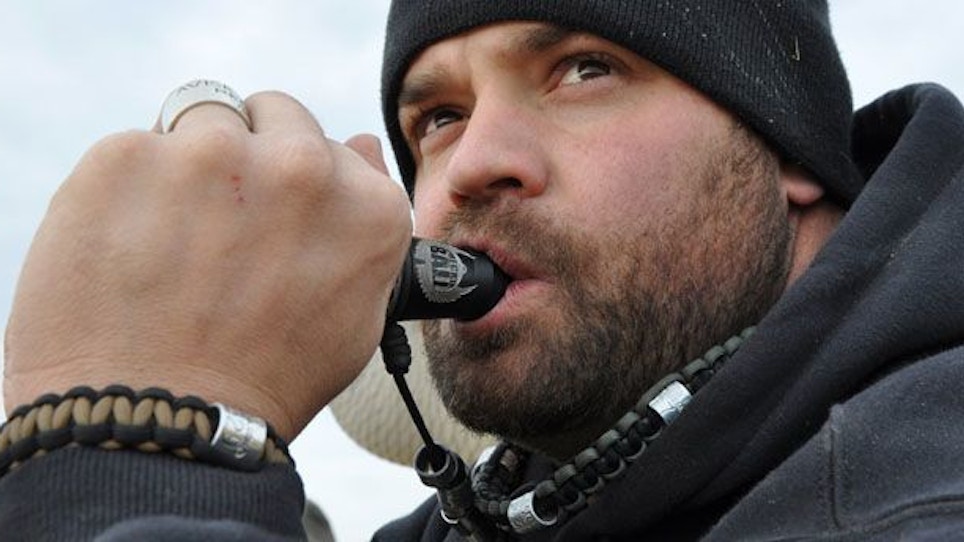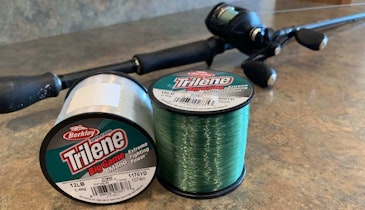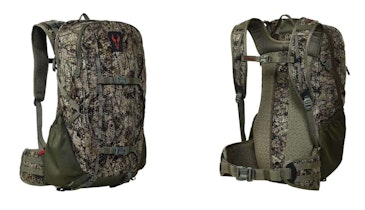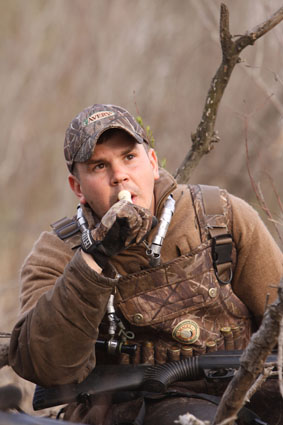 After seasons on the water and in the field, waterfowlers know that to stay ahead of the game, they must continually refine their approach. Tasks like hiding the blinds better, reading the birds, and scouting smarter are small details learned by experience. For knowledge to mature, learning from past indiscretions is key.
After seasons on the water and in the field, waterfowlers know that to stay ahead of the game, they must continually refine their approach. Tasks like hiding the blinds better, reading the birds, and scouting smarter are small details learned by experience. For knowledge to mature, learning from past indiscretions is key.
Avery Pro-staffer Field Hudnall, owner of Field Proven calls and world duck/goose calling champion, has learned a lot from communicating with Canada geese. As Hudnall became involved in contest calling, he added more notes to his vocabulary and intensified his speed and sound. While one might think that his newfound versatility would lead to greater success putting birds feet-down in the hole, Hudnall would argue otherwise. "As my calling abilities progressed, my success in the field began to decrease," says Hudnall.
As increased volume and speed become prevalent in calling contest routines, Hudnall feels the basic fundamentals of goose calling can get easily overlooked. "As I matured as a contest caller and a goose hunter, I learned that going back to basics in the field led to fuller bags," notes Hudnall. Impressing the judges on stage allowed Field to further his career, but when he tried this same barrage of notes on real birds, things were different. What he noted was that the birds became shy to his overpowering sounds and fast-paced transitions, and would slide before getting into range. After listening to live birds in the field, Hudnall toned back his calling using mainly clean clucks of various pitch, duplicating the sounds of live geese. "The results were dynamic — we started finishing more birds when we went back to basics and our hunts were more fruitful," states Hudnall.
When it comes to hunting pressured Canada geese, The Fowl Life's host Chad Belding has experienced both good and bad. After years of running what he thought was the ideal spread, his concepts have changed. "We used to set our rig with a mass of decoys around the blinds or pit," states Belding. "After years of having decoy-shy geese flare off, I decided to get in my truck and look at real geese and other hunters’ spreads."
What he found was that his spread was essentially a duplication of what many hunters were running in the area, and not like live birds. "I decided to change things up with our rig, and have since received a new level of cooperation from the birds,” he says.
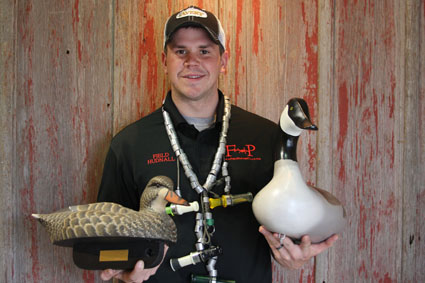 Instead of running a tight spread with a predominant black hole on the leading edge, Belding runs it very loose and up to 100 yards wide. "Spreading the decoys out keeps the birds looking at the entire rig, not just the hole, while making eight dozen decoys look like 30," states Belding. By setting his decoys in family groups ranging from three to nine decoys across a larger area, Belding's outside-the-box thinking has increased the percentage of flocks working in range. He controls the birds using calling and heavy flagging to attract their attention as they drift over the spread, calling the shot when they are within 15 yards. Belding feels his new rig "creates confidence" and allows the results to speak for themselves. When it comes to hunting pressured, birds, being atypical can lead to success.
Instead of running a tight spread with a predominant black hole on the leading edge, Belding runs it very loose and up to 100 yards wide. "Spreading the decoys out keeps the birds looking at the entire rig, not just the hole, while making eight dozen decoys look like 30," states Belding. By setting his decoys in family groups ranging from three to nine decoys across a larger area, Belding's outside-the-box thinking has increased the percentage of flocks working in range. He controls the birds using calling and heavy flagging to attract their attention as they drift over the spread, calling the shot when they are within 15 yards. Belding feels his new rig "creates confidence" and allows the results to speak for themselves. When it comes to hunting pressured, birds, being atypical can lead to success.
Changing tides, rolling seas and rocky outcrops are just part of a day on the water with owner of Pitboss Waterfowl and D3TV host Captain Jeff Coats. When navigating the waters, Coats has learned that being prepared for disaster is crucial. While every hunter is on a budget, Coats states that not having the right equipment can be "costly." Batteries die, electronics fail and things happen quickly on the water, and in order to prevent issue, Coats now carries multiple back-up safety measures.
"Over the years high-tech electronics prices have dropped, making them more accessible to all boaters," states Coats. Having necessary items like flares, a whistle and a VHF radio along with items like an extra cell phone and a registered EPRIB in a waterproof case is the bare minimum that Coats suggests. He also feels that having a handheld GPS to back up a built-in boat system is ideal in case visibilities turn minimal. Even if you have never been in a life-threatening scenario, Coats believes that everyone needs to be proactive before problems arise. "We’ve all been in situations where the weather changes at a moment’s notice, and your preparedness is what affects the outcome," reminds Coats.
Learning from past mistakes and being proactive about potential shortcomings is how hunters continually refine their skills. Whether you’re a rookie or a veteran of the sport, being open to change is what keeps us one step ahead of the birds.
